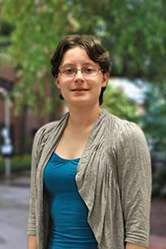Biological Sciences
“Investigating the role of PRR5, PRR7, and PRR9 in regulating plant immunity”
Successful defense against pathogens is critical for the survival of plants. The circadian clock was recently shown to play a role in the regulation of plant defense responses. Some of the central genes of the circadian clock in the model plant Arabidopsis thaliana have been demonstrated to be involved in salicylic acid (SA) mediated disease resistance. One of these genes is known to bind to the promoters of the clock genes PRR5, 7, 9. However, whether PRR5, 7, and 9 are involved in defense is currently unknown. Individual single mutants of the genes PRR5, 7, 9 have been introduced to the acd6-1 mutant, which exhibits constitutive defense, cell death, and a dwarf phenotype, making plant size a convenient indicator for the change in defense levels. The double mutants acd6-1prr5, acd6-1prr7, acd6-1prr9, and the corresponding triple and quadruple mutants are in the process of being made. Upon identification of homozygous mutants, I will assess the plant phenotypes by measuring their sizes, SA levels, cell death, and P. syringae resistance. Analysis of the recovery of the wild type phenotype, if any, will show whether the PRR5, 7, and 9 genes act in a synergistic manner in the SA pathway. Significant phenotypic recovery would be evidence for roles of these genes in defense control.
Who is your mentor for your research? How did you arrange to work with this person?
My faculty mentor is Dr. Hua Lu in the Biology department. Dr. Lu’s research is somewhat related to the work I had done last summer. I read one of her papers as background without realizing who she was, and then sent her an excited email asking if she would be interested in discussing the paper further when I returned in the fall. I met with her at the beginning of the semester, and was able to join the lab.
How did you know this was the project you wanted to do?
I didn’t. I wasn’t aware this project existed when I first contacted Dr Lu, but I got interested in it pretty quickly. My experience has been that you become interested in what you’re studying, and that what you are actually doing affects your enjoyment of the project more than the end result. Even curing cancer would be really boring and frustrating if you do the same EXACT thing EVERY day.
Is this your first independent research?
No, I had an 11-week internship at the Donald Danforth Plant Science Center in the summer of 2014.
Do you get course credit for this work?
Yes.
How much time do you put into it?
That varies depending on the week. I try to set aside at least 8-10 hours a week, but I often am not in lab the whole time, depending on how much there is to do.
How did you hear about the Undergraduate Research Award (URA) program?
A friend of mine was awarded one last year, so I’ve been aware of its existence. Dr. Lu suggested that I apply this year.
What academic background did you have before you applied for the URA?
I applied as a second semester sophomore.
Was the application difficult to do?
It was very different from previous applications I’ve done (for college, scholarships, or research internships). They care about the feasibility of the project, not about your life and why you are interested in it. I needed to show them I know what I’m talking about without making it too dense to read or going over length. I think the hardest part was finding a balance between the level of detail, the amount of explaining necessary, and the length.
How much did your mentor help you with the application?
I wrote a first draft, and then we went through a few rounds of revision together.
What has been the hardest part about your research?
Troubleshooting. Sometimes things just don’t work, and there are so many possible reasons why it might have failed.
How does your research relate to your work in other classes?
It’s been surprisingly helpful in my biology classes. Cell bio incorporates a lot of research methods into the class and exams. It’s a lot easier to interpret the results of a western blot (for example) when you have run them and know how they work and why. Conversely, what I learn in class helps me understand new aspects of what I am doing. It’s very exciting when you learn something new in class and suddenly understand some aspect about your project that you hadn’t before.
What else are you involved in on campus?
I am a member of the club fencing team, and BioCOM. I also tutor through LRC and SSS.
What is your advice to other students about getting involved in research?
Don’t be discouraged by failure – I had emailed most of the biology department before I talked to Dr. Lu. Be aware that most undergrads graduate in the spring, so that is when spaces tend to open up. Also, be willing to try talking to professors whose research seems less interesting or a little confusing. My current project isn’t something I would have thought of studying when I was searching for a lab.
What are your career goals?
I plan to continue to graduate school and hope to get a PhD in biology. I’m not quite sure what I want to do after that, though.
8/27/2015
